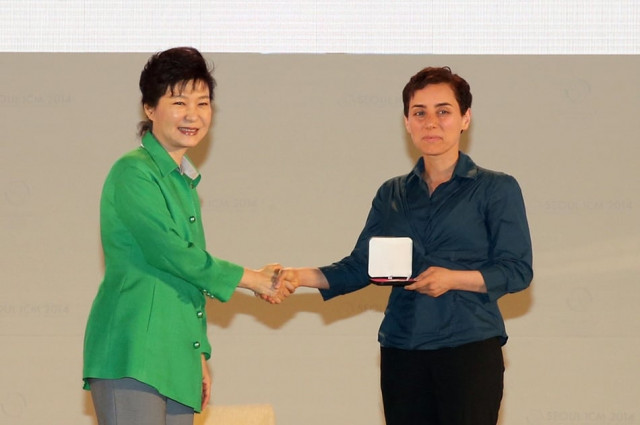Iranian is first woman to win 'Nobel Prize of maths'
Maryam Mirzakhani is one of four winners announced by the International Congress of Mathematicians.

Iranian is first woman to win 'Nobel Prize of maths'
Maryam Mirzakhani, a Harvard-educated mathematician and professor at Stanford University in California, was one of four winners announced by the International Congress of Mathematicians (ICM) at its conference in Seoul on Wednesday.
"This is a great honour. I will be happy if it encourages young female scientists and mathematicians," Mirzakhani said in a press release from Stanford University where she is a professor.
"I am sure there will be many more women winning this kind of award in coming years," she added.
The award recognised Mirzakhani's sophisticated and highly original contributions to the fields of geometry and dynamical systems, particularly in understanding the symmetry of curved surfaces such as spheres.
Although her work is considered "pure mathematics" and is mostly theoretical, it has implications for physics and quantum field theory, as well as for the study of prime numbers and cryptography.
"Fluent in a remarkably diverse range of mathematical techniques and disparate mathematical cultures, she embodies a rare combination of superb technical ability, bold ambition, far-reaching vision, and deep curiosity," the ICM said in a statement.
Mirzakhani was born in Tehran in 1977 and earned her PhD in 2004 from Harvard University.
She has previously won the 2009 Blumenthal Award for the Advancement of Research in Pure Mathematics and the 2013 Satter Prize of the American Mathematical Society.
The Fields Medal is given out every four years, often to multiple winners who should not be aged over 40.
The other three winners this year were Artur Avila of France, Manjul Bhargava of Princeton University in New Jersey, and Martin Hairer of the University of Warwick in Britain.
With no Nobel Prize awarded for mathematics, the Fields Medal is seen as the top global award for the discipline.
The medals were presented by South Korea's first woman president, Park Geun-Hye.
"I congratulate all the winners, with special applause for Maryam Mirzakhani, whose drive and passion have made her the first woman to win a Fields Medal," Park said.
Before Wednesday's ceremony all 52 previous recipients had been men.
Born and raised in Tehran, Mirzakhani initially dreamed of becoming a writer, but by the time she started high school her affinity for solving mathematical problems and working on proofs had shifted her sights.
"It is fun,it's like solving a puzzle or connecting the dots in a detective case," she said. "I felt that this was something I could do, and I wanted to pursue this path."
Although it usually involves abstract concepts of nature that might not have an immediately obvious application, Mirzakhani said she enjoyed pure mathematics because of the elegance and longevity of the questions she studies.
"It is like being lost in a jungle and trying to use all the knowledge that you can gather to come up with some new tricks, and with some luck you might find a way out," she said.
Mirzakhani became known on the international mathematics scene as a teenager, winning gold medals at both the 1994 and 1995 International Math Olympiads -- finishing with a perfect score in the latter competition.
In 2008 she became a professor of mathematics at Stanford, where she lives with her husband and three-year-old daughter.
"On behalf of the entire Stanford community, I congratulate Maryam on this incredible recognition, the highest honour in her discipline, the first ever granted to a woman," said university president John Hennessy.



















COMMENTS
Comments are moderated and generally will be posted if they are on-topic and not abusive.
For more information, please see our Comments FAQ